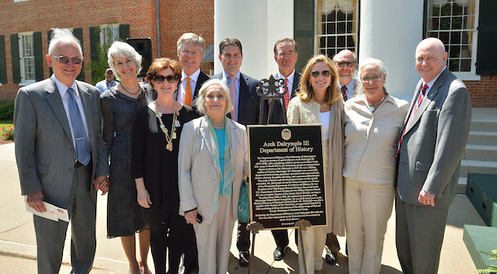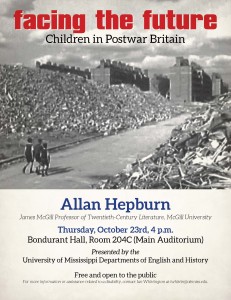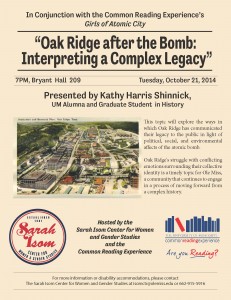John Neff, associate professor of history and director of the University of Mississippi’s Center for Civil War Research, offers his perspective on Civil War symbols in today’s society on Southern Education Desk. 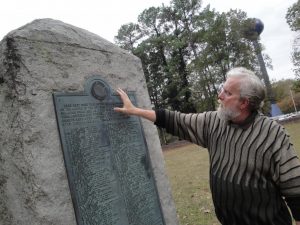
Archive for the ‘News and Events’ Category
John Neff Featured on Southern Education Desk
Conference on Gender, War, and Memory in the Anglo-American World
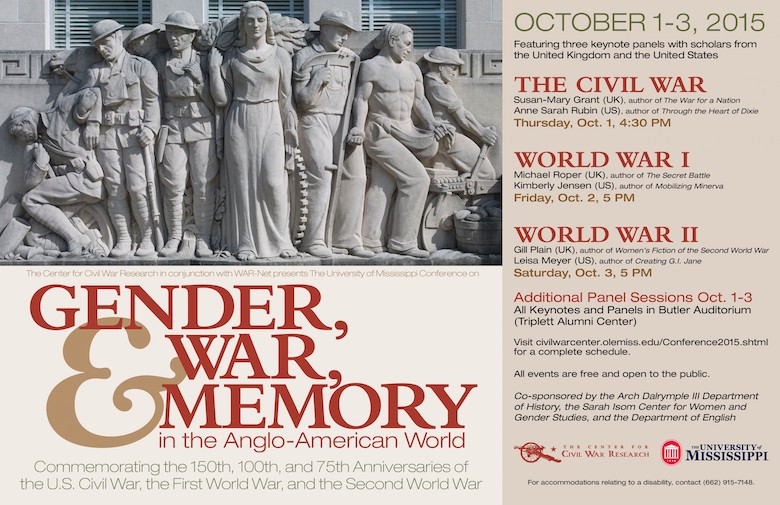 Please join the Center for Civil War Research and WAR-Net for the University of Mississippi Conference on Gender, Memory, and War in the Anglo-American World, which commemorates the 150th, 100th, and 75th Anniversaries of the U.S. Civil War, the First World War, and the Second World War. Panels will take place at Butler Auditorium on Thursday, Friday, and Saturday, October 1-3, 2015. The keynote speakers will be Anne Sarah Rubin of the University of Maryland, Baltimore County and Susan-Mary Grant of Newcastle University. All events are free and open to the public. For more information contact the Arch Dalrymple III Department of History at 662.915.7148 or via email, history@olemiss.edu.
Please join the Center for Civil War Research and WAR-Net for the University of Mississippi Conference on Gender, Memory, and War in the Anglo-American World, which commemorates the 150th, 100th, and 75th Anniversaries of the U.S. Civil War, the First World War, and the Second World War. Panels will take place at Butler Auditorium on Thursday, Friday, and Saturday, October 1-3, 2015. The keynote speakers will be Anne Sarah Rubin of the University of Maryland, Baltimore County and Susan-Mary Grant of Newcastle University. All events are free and open to the public. For more information contact the Arch Dalrymple III Department of History at 662.915.7148 or via email, history@olemiss.edu.
Theda Perdue to Present 2015 Gilder-Jordan Lecture
On Wednesday, September 9 at 7pm in the University’s Nutt Auditorium, Theda Perdue of the University of North Carolina at Chapel Hill will present the 2015 Gilder-Jordan Lecture in Southern History. Earlier in the day, Dr. Perdue will meet with graduate students in history and Southern Studies.
Perdue’s talk is entitled “Indians and Christianity in the New South.” The lecture is partly inspired by UM Professor Emeritus of History and Southern Studies Charles Reagan Wilson. Perdue notes that “when I began to think about Christianity and southern Indians, Charles’s work came immediately to mind. Historians tend to categorize the past–politics, the economy, intellectual life, the arts, religion, race, gender, and so forth. But the human experience is much more muddled. Charles has an extraordinary ability to make the muddle intelligible without sacrificing its complexity. I greatly admire his scholarship, his editorial skill, and his administrative abilities, and I value his long professional friendship.”
Theda Perdue is the Atlanta Distinguished Professor Emerita of Southern Studies at the University of North Carolina, Chapel Hill, where she taught American Indian history in the history, women’s studies, and American studies departments. She holds a Ph.D. from the University of Georgia. Perdue is author, co-author, or editor of sixteen books including Cherokee Women: Gender and Culture Change, “Mixed Blood” Indians: Racial Construction in the Early South, and Race and the Atlanta Cotton States Exposition of 1895. She also has appeared frequently as a talking head in documentary films. She has held fellowships from the Rockefeller Foundation, the Newberry Library, the National Humanities Center, the Woodrow Wilson Center, and the John Simon Guggenheim Foundation. Perdue has served as president of the Southern Association for Women Historians, the American Society for Ethnohistory, and the Southern Historical Association. She is an inveterate traveler, especially by train, and in 2009 she and her husband went around the world by land and sea, a trip that included crossing Europe and Asia by train and the Pacific by freighter. Her current book project is on American Indians in the segregated South.
Mikaëla M. Adams, a UM assistant professor of history who specializes in Native American studies, is a former student of Perdue’s who is eager to learn more about her new research.
“I think the lecture will be a wonderful opportunity for our students here at the University of Mississippi to engage with a topic that often is neglected in Southern history: the story of indigenous people,” Adams said. “Theda’s work reminds us that there is more to Southern history and culture than the black-and-white binary we are most familiar with. She helps put native people back into the picture, which complicates our understandings of race, culture, identity and sovereignty.”
Past Gilder-Jordan Lecturers include Barbara Field of Columbia University, David Blight of Yale University, Grace Hale of the University of Virginia, Walter Johnson of Harvard University, and most recently in 2014, Jacquelyn Dowd Hall of the University of North Carolina. Learn more about past lectures here.
Organized through the Center for the Study of Southern Culture, the African American Studies Program, Center for Civil War Research, and the Department of History, the Gilder-Jordan Speaker Series is made possible through the generosity of the Gilder Foundation, Inc. The series honors Richard Gilder of New York and his family, as well as his friends, Dan and Lou Jordan of Virginia.
For questions about the lecture, contact Becca Walton at rwalton@olemiss.edu.
By Becca Walton | August 7, 2015
UM History Department Named for Arch Dalrymple III
The late Arch Dalrymple III would likely have become a history professor, except that his father’s untimely death kept the young University of Mississippi (UM) graduate at home to run the family’s businesses and take care of his mother and younger sisters.
Dalrymple first came to the university in the early 1940s, left to serve as an officer in the U.S. Army during World War II and then returned to earn an undergraduate degree in history in 1947. While he was in the service, he earned college credit from Amherst College and Cornell University.
As the Amory, Mississippi, native developed into a highly successful businessman and widely respected civic leader, Dalrymple found avenues to pursue his love of history and contribute to his state’s historic preservation efforts, including 32 years as a trustee of the Mississippi Department of Archives and History (MDAH). He also served as president of the Mississippi Historical Society in 1976-77.
Today, UM leaders announced the first named department on the Oxford campus: the Arch Dalrymple III Department of History. Martha Dowd Dalrymple, his daughter and business partner, joined the announcement to reveal her $5 million gift to undergird teaching, research and service efforts of the Arch Dalrymple III Department of History.
“Daddy was passionate about history. One of his final wishes before his death in 2010 was that an endowment be created at the University of Mississippi Department of History. He always felt our lives are shaped by the lessons we learn from history,” said Martha Dalrymple. “Daddy was a part of the ‘greatest generation’ that instilled in him the value of a strong work ethic and the importance of giving back to his country, state and community. Our family has had a long history with the University of Mississippi, and I am pleased to give back to honor his name.”
UM Chancellor Dan Jones and Martha Dalrymple unveiled a large bronze plaque to be installed in Bishop Hall, home to the history department.
“This is truly a great day in the life of the University of Mississippi,” the chancellor said. “We are extremely proud for our Department of History to bear the name of such a brilliant man, a dedicated scholar and influential leader. When students, faculty, visitors and others see the Arch Dalrymple name, we want them to be inspired by his deep commitment to history and historic preservation and by his tremendous commitment to service. Our state is stronger because of Arch Dalrymple, and now his alma mater is stronger because of this gift made in his memory.”
Previously, in 1986, Arch and his wife, Adine Lampton Wallace Dalrymple, had funded the Dalrymple Lecture Series in Mathematics at UM to bring distinguished speakers in mathematics to campus. “To Daddy, history and math were the two most important areas of study needed to strengthen our great nation. One of his favorite quotes was that of Winston Churchill – ‘The farther back you can look, the farther forward you are likely to see,’” Martha Dalrymple said.
Holmes Adams of Jackson, Mississippi, Arch Dalrymple’s attorney and friend for more than 25 years, spoke to the fitting nature of his name being permanently linked with the university and the study of history.
“It is appropriate to name the Department of History for Arch Dalrymple because he was a true amateur historian in the classic sense of the word ‘amateur,’ that is, one who engages in a study, sport or activity for pleasure, not for financial benefit or professional reasons. If my memory is correct, the word ‘amateur’ derives from the Latin verb ‘amo,’ or ‘I love.’ Arch loved the study of history – of his home community, his state, his country and the world.”
That love and dedication can be seen through his work with MDAH, the comprehensive historical agency that collects, preserves and provides access to the archival resources of the state; administers museums and historic sites; and oversees statewide programs for historic preservation, government records management and publications, said Elbert Hilliard, MDAH director emeritus, who worked with Arch Dalrymple for three decades.
“Arch Dalrymple was a man of great courage and integrity. He stood with the MDAH staff and provided invaluable support for the department’s administration and implementation of the State Antiquities Act that was enacted by the Mississippi legislature to help preserve our state’s historic sites and buildings for future generations,” Hilliard said. “Mr. Dalrymple had a great love of history and was a MDAH trustee whom you could count on to stay abreast of issues related to the department’s mission.”
Joseph Ward, chair of history, expressed appreciation for the naming of the department and the infusion of new resources, which will be held in a permanent endowment.
“Martha Dalrymple’s decision to honor her father in this way will be a lasting benefit to the Department of History’s faculty and students. It will enhance research and teaching in every area of historical scholarship we offer. The confidence that Ms. Dalrymple has shown in our faculty and students through her incredible generosity will provide great encouragement to our work both now and far into the future.”
The endowment at the state’s flagship university now stands at approximately $600 million, and endowed gifts, such as Dalrymple’s, provide the margin of excellence in academics. “This magnificent gift provides a permanent tribute to the extraordinary life of Arch Dalrymple,” said Deborah Vaughn, senior executive director of development and chief development officer. “In addition, this significant investment will have a far-reaching impact on the lives of our history students and faculty, as they pursue meaningful study and research.”
Former Mississippi Gov. William Winter was a college classmate and longtime friend with the honoree. “This is a highly important and timely recognition of one of Ole Miss’ most distinguished alumni. Arch was a dedicated and highly informed historian, who developed much of his interest in history as a result of his study under the great history professors who were a part of the Ole Miss faculty when we were there together in the 1940s. The importance of the study and knowledge of history was passionately felt by Arch, and he did much to advance that cause in our state.”
Dalrymple’s business interests included farming, timber, cattle, commercial and residential real estate, and oil and gas. He was a passionate sportsman and conservationist, tireless advocate for public education, and a generous philanthropist. He created the Dalrymple Family Foundation to benefit the arts, culture, education, humanities and conservation in Northeast Mississippi. Martha Dalrymple serves as president of the foundation. Her husband is James L. Cummins, the executive director of Wildlife Mississippi.
Arch Dalrymple served on the U.S. Department of State’s Foreign Officer Selection Board and on the Mississippi Economic Council and as the first chairman of the Amory City Planning Commission. He was a longtime trustee of the Amory School District, serving as president from 1968 to 1972, as well as a design advisor for construction of the Amory Middle and Elementary schools. He initiated the founding of the Mississippi Schools Board Association and was a member of the Mississippi Governor’s School Finance Study Group.
He served for many years as a director on the Trustmark National Bank board. He was also a member of the Society of the Cincinnati, an organization founded in 1783 consisting of direct descendants of the officer corps of Gen. George Washington’s Continental Army. At his alma mater, he provided guidance on the School of Engineering Advisory Board, as well as the Ole Miss Alumni Association Board. Widely read in history, government, economics and foreign affairs, Dalrymple was admired as an amusing and knowledgeable storyteller.
He wrote six volumes of family history for his three daughters – Martha Dalrymple of Amory, Mary Cameron of Oxford and Jane Dalrymple-Hollo of Boulder, Co. – three grandchildren and his extended family. Mary Cameron, her husband, Alan, and their daughter Adine, all graduated from Ole Miss.
In one of the volumes Arch Dalrymple wrote about family trees: “Assembling charts and dates is really pretty dull stuff. More interesting and instructive is learning just who the people were – how they fit into the time stream of history and the fabric of the society in which they lived – in short, to put a name, an individual in historical context. Only then does the ‘tree’ come to life.”
Arch Dalrymple’s sisters, the late Jane Whitehead of Memphis, Tenn., and Martha Guffey of Dallas, Texas, are both Ole Miss alumna. Guffey said she believes under different family circumstances her brother would have become a history professor, making the naming of the history department very meaningful.
“Arch would have been very pleased,” she said of the announcement. “He had a good experience at Ole Miss, and history professor Jim Silver was a favorite of his, as well as others.”
A connoisseur of architecture and landscape design, Dalrymple also traveled extensively in Europe with his beloved wife, “Deanie,” and was particularly fond of visiting Scotland, where he cultivated many friendships. The Dalrymples were members of the First Presbyterian Church of Amory.
By Tina Hahn | April 27, 2015
Graduate Student Travis Jaquess Wins Three Minute Thesis (3MT) Research Competition
University of Mississippi history graduate student Travis Jaquess, whose research focuses on fatherhood in colonial America, recently tied for first place in the university-wide Three Minute Thesis (3MT®) competition. This competition celebrates the exciting research conducted by masters and doctoral students. Developed by the University of Queensland and promoted by graduate schools around the world, the exercise cultivates students’ academic, presentation, and research communication skills. The competition challenges graduate students to explain their research thesis/dissertation topic and its significance in three minutes using one PowerPoint slide and language appropriate to a nonspecialist audience, a critical skill for graduate students across all academic disciplines. Watch Jaquess’s award-winning presentation here.
Students Study Oprah Winfrey in ‘The Power of O’
As the warm coffee aroma filled Starbucks, Professor Shennette Garrett-Scott and her students met for a lecture while enjoying Teavana Oprah Chai Tea Lattes.
The tea was appropriate for the class, “The Power of O,” which focuses on billionaire Oprah Winfrey.
Winfrey, who was born in Mississippi, is an influential figure in many different areas. She is an actress, a movie and television producer, a philanthropist and an award-winning talk show host who owns a cable television network.
Garrett-Scott, an assistant professor of history and African-American Studies, said that she created the course as a way to “look critically at various aspects of Oprah’s life, career and brand to contextualize her experience.”
“My goal is to share some of my ruminations about Oprah’s impact on American culture and contemporary black women,” said Garrett-Scott, who was the speaker at a brown-bag event in February entitled “‘Oprah Don’t Play!’: Black Women and the (A)Politics of Respectability in the 21st Century.”
“Though Oprah’s story is often told as a rags-to-riches tale of an exceptional individual who overcame incredible odds, she did not emerge out of a vacuum nor does she operate in one,” Garrett-Scott said. “I wanted to draw in considerations of politics and the economy — or, more to the point, money and power — in and beyond popular media.”
The objective of the “Power of O” course, according to the syllabus, is to pay close attention to race and representation, gender, sexuality, economics and politics to explore where power lies and how it operates. Eight students are enrolled in the seminar class.
Dyamone White, a senior majoring in integrated marketing communications, is a student in the class.
“There are so many misconceptions about Oprah and her life, but Dr. Scott has revealed with evidence some true facts that make Oprah seem so regular – just like us,” White said.
Parker Hill, a philosophy major and student in the course, said that her most enjoyable discussion was based on an article identifying Oprah as a de facto feminist.
“The author claimed that despite her accumulation of wealth, allowing her to speak as freely as she pleases, the negative connotations of being a feminist made Oprah disassociate herself from being one in name,” Hill said. “Ironically, her personal actions comply with the idea of a feminist by some definitions. Some agreed with the assessment, others did not, but it was still interesting to discuss.”
When asked how black women can gain respect in the 21st century, Garrett-Scott responded, “The proper question to ask would be, ‘What can black women learn from their past to equip them for the challenges of the 21st century?’”
She continued on to say, “In some ways, these challenges are unique to our particular time and place. In others, they are persistent challenges in a society that continues to devalue blackness and womanness.”
Though Oprah is the focus of the course, “The Power of O” includes topics other than Oprah herself.
“We discuss theories like Antonio Gramsci and cultural hegemony and Jürgen Habermas and public spheres,” Garrett-Scott said.
The class has also explored the history of representations of black woman in popular media.
By Tisha Coleman | April 1, 2015 | courtesy of The Daily Mississippian
Allen Hepburn on “Facing the Future: Children in Postwar Britain”
On Thursday, October 23rd at 4pm in Bondurant Auditorium, the departments of English and History will present a talk by Allan Hepburn of McGill University, entitled “Facing the Future: Children in Postwar Britain” (see the attached poster). His talk will focus on representations of children in British literature and film between 1945 and 1960 in the light of contemporaneous debates about child refugees, postwar rebuilding, and the rights and responsibilities of British citizenship. All are heartily encouraged to attend. Those of you teaching courses in twentieth century history and culture should feel welcome to invite your students.
Dr. Hepburn is the James McGill Professor of Twentieth-Century Literature at McGill University. He is the author of Intrigue: Espionage and Culture (2005) and Enchanted Objects: Visual Art in Contemporary Fiction (2010). He has edited three volumes of Elizabeth Bowen’s uncollected stories, essays, and broadcasts, and is currently writing a book about “Faith and British Culture, 1939-1962,” as well as a book about Elizabeth Bowen’s major fiction.
Kathy Harris Shinnick on “Oak Ridge after the Bomb: Interpreting a Complex Legacy”
On Tuesday, October 21, 2014, UM Alumna Kathy Harris Shinnick, a 2000 graduate of the Liberal Arts department at the University of Mississippi with a double major in English and History, presents on “Oak Ridge after the Bomb: Interpreting a Complex Legacy” in conjunction with the Common Reading Experience.
After working in sales for ten years Shinnick rediscovered her passion for history. In 2010 she enrolled as a Public History master’s student at the University of Massachusetts in Boston. She is finishing work on her Master’s thesis, which discusses the ways in which Oak Ridge has presented their complicated history to the public. In May she accepted an internship with Adidas in their History Management Department in Nuremberg, Germany, where she currently lives.
UM to Host Conference on “Textual Science and the Future Of The Past”
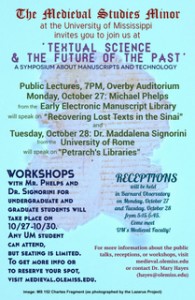 The “Textual Science and the Future of the Past” Manuscript Symposium will be taking place on October 27th-30th. More information and a full schedule of events can be found at http://medieval.olemiss.edu (and on the attached poster).
The “Textual Science and the Future of the Past” Manuscript Symposium will be taking place on October 27th-30th. More information and a full schedule of events can be found at http://medieval.olemiss.edu (and on the attached poster).
The symposium will feature two plenary lectures: on Monday, October 27th, Mike Phelps of the ‘Early Manuscript Electronic Library’ will be speaking on “Recovering Lost Texts in the Sinai: Palimpsest Manuscripts at St. Catherine’s Monastery of the Sinai” (in Overby, 7PM), and on Tuesday, October 28th, Dr. Maddalena Signorini of the University of Rome will be speaking on “Petrarch’s Library” (in Overby, 7PM).
The symposium will also feature private workshops with the two speakers for undergraduate and graduate students, who must sign up in advance and reserve their spots (at medieval.olemiss.edu). The two undergraduate workshops on medieval manuscripts will be Monday, October 27th, with Maddalena Signorini (3:30-5 PM in the Lawrence Room, 3rd floor of J. D. Williams Library) and Tuesday, October 28th, with Mike Phelps (3:30-5 PM in the Lawrence Room, 3rd floor of J. D. Williams Library). The two graduate workshops on medieval manuscripts will be on Wednesday, October 29th, with Mike Phelps (3:00-5:00 in the Lawrence Room, 3rd floor of J. D. Williams Library), and Thursday, October 30th, with Maddalena Signorini (3:00-5:00 in the Lawrence Room, 3rd floor of J. D. Williams Library).
The Overby Center Presents “Symbols of Exclusion: The Semiotics of Race in Public Spaces”
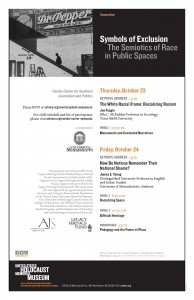 The Overby Center for Southern Journalism and Politics presents “Symbols of Exclusion: The Semiotics of Race in Public Spaces,” on October 23-24, 2014.
The Overby Center for Southern Journalism and Politics presents “Symbols of Exclusion: The Semiotics of Race in Public Spaces,” on October 23-24, 2014.
This interdisciplinary symposium explored emerging Holocaust research on the semiotics of race in public spaces and efforts to memorialize histories of racialized atrocities, as well as current research on these topics in the American South. It was co-organized by the United States Holocaust Memorial Museum’s Jack, Joseph and Morton Mandel Center for Advanced Holocaust Studies and the University of Mississippi’s Department of Sociology and Anthropology and the Critical Race Studies Group.
By bringing together scholars, teachers, students, and community members, the Mandel Center’s outreach symposia seek to enrich campus dialogue and forge connections with diverse audiences that will ensure the vitality of Holocaust studies in an increasingly interdisciplinary and multicultural academic landscape.
